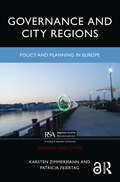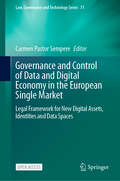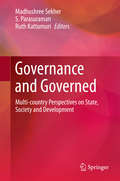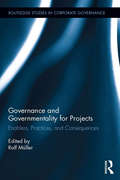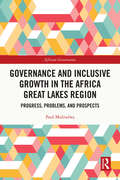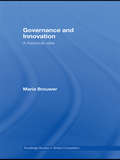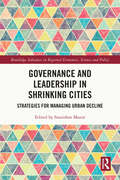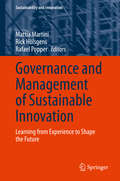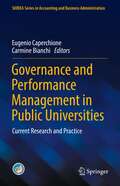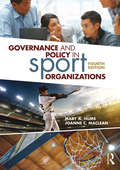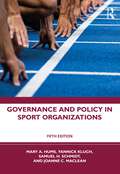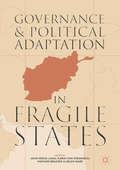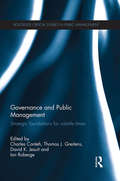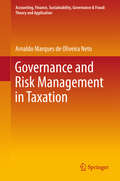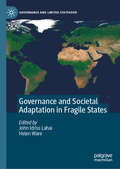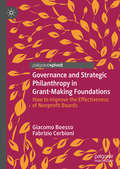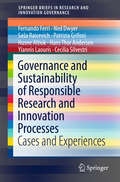- Table View
- List View
Governance and City Regions: Policy and Planning in Europe (Regions and Cities)
by Karsten Zimmermann Patricia FeiertagCity-regions are areas where the daily journeys for work, shopping and leisure frequently cross administrative boundaries. They are seen as engines of the national economy, but are also facing congestion and disparities. Thus, all over the world, governments attempt to increase problem-solving capacities in city-regions by institutional reform and a shift of functions. This book analyses the recent reforms and changes in the governance of city-regions in France, Germany and Italy. It covers themes such as the impact of austerity measures, territorial development, planning and state modernisation. The authors provide a systematic cross-country perspective on two levels, between six city-regions and between the national policy frameworks in these three countries. They use a solid comparative framework, which refers to the four dimensions functions, institutions and governance, ideas and space. They describe the course of the reforms, the motivations and the results, and consequently, they question the widespread metropolitan fever or resurgence of city-regions and provide a better understanding of recent changes in city-regional governance in Europe. The primary readership will be researchers and master students in planning, urban studies, urban geography, political science and governance studies, especially those interested in metropolitan regions and / or decentralisation. Due to the uniqueness of the work, the book will be of particular interest to scholars working on the comparative European dimension of territorial governance and planning.
Governance and Control of Data and Digital Economy in the European Single Market: Legal Framework for New Digital Assets, Identities and Data Spaces (Law, Governance and Technology Series #71)
by Carmen Pastor SempereIn an era where the digital realm is evolving at an unprecedented pace, the legal framework must adapt accordingly to ensure effective governance and control. This open access book explores the intricate web of regulations governing new digital assets, identities, and data spaces within the European Single Market. Through a comprehensive exploration of emerging concepts, it provides clarity amidst complexity and empowers stakeholders to navigate the evolving digital landscape with confidence, making it essential reading for legal professionals, policymakers, regulators, academics, and industry practitioners. The book explains the need for legal adaptations to incorporate new technologies in the European Union, focusing on regulating Distributed-Ledger Technologies (DLT/Blockchain) and crypto-assets through the MiCA Regulation. It discusses the challenges and opportunities involved in ensuring stability and user protection and investigates the regulatory frameworks for Asset-Referenced Tokens, E-money Tokens, Utility Tokens, and Non-Fungible Tokens (NFTs). It also addresses related topics such as artificial intelligence, digital identities, data spaces, and cyber-security, providing an analysis rooted in European law that points to the European Roadmap to the Digital Decade for 2030. It deals with the European Digital Identity in the eIDAS2 Regulation and the Artificial Intelligence Act, both adopted in 2024, providing a lege ferenda perspective. Additionally, the book examines Open Data and Open Finance, emphasizing their roles in promoting competition and innovation while addressing data privacy and security concerns. It covers the implications and challenges of Digital Money and Digital Payments, particularly in the context of the Digital Euro project, the impact on monetary policy and financial inclusion, and the European Digital Identity — the EU Digital Identity Wallet, EUDI — enabling mutual recognition of electronic identification systems across EU countries.
Governance and Fund Management in the Chinese Pension System
by Gregorio Impavido Yu-Wei Hu Xiaohong LiA report from the International Monetary Fund.
Governance and Governed
by S. Parasuraman Madhushree Sekher Ruth KattumuriBuilding, largely, on insights from India, and case studies in Brazil, China, and South Africa, this book provides insights into the contested topic of 'governance and governed' from a state-society inter-relationship perspective. It argues that the centrality of an understanding of state-governance today is rooted in concerns regarding diversities and contingencies of concrete political reality to address inequalities, exclusion and vulnerabilities. These countries are part of the BRICSs consortium, and have been recognised for their growth potential in the world economy. But their economic progress alone may not necessarily translate into a better quality of life. The approach here is not to focus on a particular understanding of governance, but to utilise a wider lens to understand the nature and extent of incremental processes in the different case-study contexts in order to offer a broader framework for procedural and substantive understanding of governance, rather than a prescription of a government and its activity of governing. The focus is on deriving practical lessons about governance process that are of interest to the wider development community.
Governance and Governmentality for Projects: Enablers, Practices, and Consequences (Routledge Studies in Corporate Governance)
by Ralf MullerThis research-based book takes an organization-wide perspective to describe the governance and governmentality for projects in organizations. Governance of projects defines and directs the ways managers of projects, programs, and project portfolios carry out their work. Governmentality is the way the managers of these managers present themselves to those they lead.Governance and Governmentality for Projects starts with introducing existing theories, models and paradigms for governance and governmentality. It then develops a chronological framework of the ways governance and governmentality for projects is enabled in organizations, how it subsequently unfolds in organizations of different types and sectors, and the consequences of different governance approaches for project results, trust, control, and ethical issues in projects. Special emphasis is given to the link between corporate governance and the governance of project, programs and project portfolios. Three real-life case studies exemplify the research findings described in the book. Through its structure this book describes the development of governance and governmentality in the realm of projects from its organizational origins, via observable practices, to expected consequences of different implementations. Aimed at academics, post-graduate students in business and management, reflective practitioners, standards or policy developers, those in governance roles and others in need of a detailed knowledge of the spectrum of project related governance in organizations, this book will help develop a comprehensive understanding of the theoretical and practical underpinnings of the subject, their interaction, and implications for implementation. This allows for understanding and developing of both generic and idiosyncratic governance structures, such as those needed in project-based organizations.
Governance and Inclusive Growth in the Africa Great Lakes Region: Progress, Problems, and Prospects (African Governance)
by Paul MulindwaThis book provides a comprehensive analysis of the development and governance nexus in Africa’s Great Lakes region. The Great Lakes region continues to experience many challenges, yet much of the literature continues to focus on political governance, leaving behind the socio-economic aspects of the everyday lives of people in the region. This book seeks to bridge this gap in information, considering the social, economic, and cultural dynamics of the population as they inter-play with political discourse as key factors of sustainable development. Drawing on empirical cases and examples from Burundi, Kenya, Rwanda, South Sudan, and Uganda, the book analyses each of the major governance and development issues in Great Lakes region of Africa, including region building and integration, social protection, inter-state relations, democracy and participation, and sustainability. Written by an African scholar with over 20 years of experience of working with indigenous groups in over 34 African countries, this book will be an important read for students and scholars across the fields of international relations, political studies, sustainable development (social and economic), sociology, public policy and management and public administration.
Governance and Innovation: A historical view (Routledge Studies In Global Competition Ser.)
by Maria Brouwer"This provocative book applies law and finance theory to a wide range of issues bearing on corporate governance and business history. Brouwer's analysis should hold particular interest for students and scholars interested in comparative governance."Joseph A. McCahery, Professor of Corporate Governance and Innovation, University of Amsterdam Center
Governance and Internal Controls for Cutting Edge IT
by Karen F. WorstellTo remain competitive we rely on being early adopters of new technologies - but there are inherent risks. As we implement these technologies, how do we manage the risks without hindering the progress of the business? In Governance and Internal Controls for Cutting Edge IT, Karen Worstell explains strategies and techniques to guide IT managers as they implement cutting edge solutions for their business needs. Based on practical experience and real-life models, she covers key principles and processes for the introduction of new technologies and examines how to establish an appropriate standard of security and control, particularly in the context of the COBIT 5® framework and affiliated standards. This book will enable you to apply security and control methods that are suitable for your business, ensure that you make the most of the potential benefits, and are aware of the potential risks of your IT provision. It will show you how the application of appropriate standards can improve stakeholder relationships and enhance your service management and delivery, enabling you to maximize the opportunities that are presented by compliance legislation and regulations. You will learn how to manage your data storage, recovery and migration - particularly in the context of the Cloud, ensure business continuity in the face of an incident, and implement strategies to cover the risk of business interruption.
Governance and Leadership in Health and Safety: A Guide for Board Members and Executive Management
by Waddah S. Ghanem Al Hashmi Bob ArnoldThis book is a leadership guide to the effective implementation of the ISO 45001:2018 standard. It takes the high-level leadership and top management principles put forward in ISO 45001 and develops them into a comprehensive discourse on how, at the very top of any organization, large or small, leaders can drive the occupational health and safety (OH&S) agenda and ensure the effective implementation of the OH&S management systems. While the standard sets out expectations for top management, this book provides a clear explanation of the OH&S roles, responsibilities, and accountabilities between those who direct the organization and drive it towards achieving its strategic aims and those who lead the day-to-day operations. It puts forward a purposeful, easy-to-follow, and effective system for the implementation of ISO 45001 whilst also, and more importantly, maximizing the value proposition of such a global standard, regardless of industry. The book is written for top management teams of both non-executive and executive leadership, as well as senior advisors, in all organizations seeking to effectively implement OH&S policies and management systems. It can also be utilized to create training and learning materials to assist with implementation.
Governance and Leadership in Shrinking Cities: Strategies for Managing Urban Decline (Routledge Advances in Regional Economics, Science and Policy)
by Stanisław MazurThe aim of this publication is to look in depth at depopulation - a trend that is affecting an increasing number of cities worldwide. It has recently become a critical issue with a range of detrimental social, economic, spatial, and financial consequences. However, attempts by central and local governments to combat depopulation have yet to yield satisfactory results. Compelling evidence suggests that one of the reasons for this state of affairs is that the role of local (urban) leadership in devising solutions, mobilizing resources, and creating networks to address the problem has been underestimated. Moreover, according to the authors of this monograph, there is a significant positive correlation between urban leadership and the ability to effectively respond to and counteract the negative effects of depopulation. Without an understanding of the impact of urban leadership on the ability to address the negative consequences of urban depopulation, it is impossible to pursue effective public policies in this regard. This book presents a novel approach to explaining the ability of cities to combat depopulation through the prism of urban leadership quality. It compares domestic empirical research findings with international case studies, and offers a comprehensive review of valuable practices to counter urban shrinkage and depopulation, from both academic and practical perspectives. Further, the book provides a new interpretation of the processes associated with these trends. The magnitude of the phenomenon in question, the negative spatial, economic, and social consequences, as well as the relatively low effectiveness of policies aimed at its mitigation, will make this book an invaluable guide for researchers, and students from a wide range of disciplines including urban studies, economics, public management, leadership studies, local government, climate change and energy transition and urban movements. The audience will also comprise of policymakers and urban experts such as sociologists, planners, social geographers, economists, and architects.
Governance and Management of Sustainable Innovation: Learning from Experience to Shape the Future (Sustainability and Innovation)
by Mattia Martini Rick Hölsgens Rafael PopperSustainable innovation (SI) is considered to be a key driver of societal progress in an era of enormous economic, environmental and societal challenges, and the uncertainties and future consequences that come with them. This book provides evidence, insights and reflections related to specific issues of governance, the management of sustainable innovation and applying a multi-level, multi-stakeholder approach to sustainable innovation analysis. Building on the European Commission (EU) funded research project “Public Participation in Developing a Common Framework for the Assessment and Management of Sustainable innovation” (CASI), it presents tools for assessing and managing sustainable innovation, and reflects on SI-related policies as well as citizens’ aspirations. The book is intended for scholars in the field of sustainable innovation, as well as to policymakers, innovators, students and citizens.
Governance and Performance Management in Public Universities: Current Research and Practice (SIDREA Series in Accounting and Business Administration)
by Eugenio Caperchione Carmine BianchiThis edited volume contributes to the ongoing research and practice on applying performance management to university governance. A comparative approach and international perspective of the issue is provided through extensive use of case studies and empirical findings. A specific focus is also placed on using performance governance applied to higher education institutions' Third Mission, and on enhancing decision makers’ ability to frame dynamic complexity. In this regard, specific attention is devoted to analyzing the cause-and-effect relationships in affecting public outcomes. This also includes managing trade-offs in both time and space, and detecting and counteracting unintended behavioral effects from the use of formal systems focused on quantitative measures for performance assessment.
Governance and Performance in the German Public Research Sector
by Dorothea JansenToday, higher education and research institutions are confronted with variable and sometimes contradictory demands from state, industry and society. They have to face growing volatility in education policy, and a research paradigm that sees an accelerating rate of knowledge growth as well as the internationalization of the knowledge process itself. It is vital that academics and policymakers stay abreast of the impact that policy changes have on education and research in tertiary institutions. Based on a sector-specific theory model for the governance of research organizations, this book outlines evidence of the effects of the so-called 'new public management reforms' in the German university and public research sector. The volume aims to shed some light on the differences between the disciplines in input, throughput, profiles of output and the typical conditions of knowledge production, disparities that are currently little understood and are thus not reflected in government policy as ministers implement new governance forms in the research system. It analyzes in detail these new forms, and demonstrates how they affect knowledge production and research performance from the level of research group up to that of the system itself. The authors focus on a set of disciplines that represent the breadth of research divisions in major universities: natural science fields oriented to basic research (astrophysics), two application-oriented fields from the natural sciences (nanoscience and biotechnology), a social science field (economics) and a humanity field (medieval history).
Governance and Policy in Sport Organizations
by Mary A. Hums Joanne C. MacLeanNow in a fully updated new edition, this textbook introduces readers to the power and politics of sport organizations. It explores the managerial activities essential to good governance and policy development, and looks at the structure and functions of individual organizations within the larger context of the global sport industry. Reflecting the latest industry changes, it draws on a fresh selection of real-world examples to demonstrate the types of dilemmas that sport managers face every day. Professional administrators from a wide variety of sport organizations also offer their insights, giving readers a glimpse into the real concerns of sport professionals and the impact of governance and policy on their jobs. Exploring current topics, such as sport and human rights, refugees, social media, and the evolution of eSports, this practical and accessible textbook helps readers to see the big picture of the contemporary sport industry and find their place in it as future sport managers. Complemented by a new companion website full of useful ancillary materials, this is an essential resource for all sport management students and instructors.
Governance and Policy in Sport Organizations
by Mary A. Hums Joanne C. MacLean Yannick Kluch Sam H. SchmidtNow in a fully updated and expanded fifth edition, this textbook introduces the power and politics of sport organizations to the readers. It explores the managerial activities essential to good governance and policy development and looks at the structure and functions of individual organizations within the larger context of the global sport industry. Full of real-world examples, cases, and data, this book examines the dilemmas faced by sport managers, administrators, and policymakers in their everyday work, helping readers to understand the importance of good governance and sound policy frameworks in any successful sport organization. Introducing core managerial functions and surveying every sector of contemporary sport from school and community sport to professional leagues and international megaevents, this edition includes brand-new chapters focused on diversity, equity, and inclusion; on esports; and on governance in times of crisis, covering issues such as COVID-19, climate change, scandal, and security risks. Helping readers to see a big picture across the contemporary sport industry, at all levels, and to find their place in it as future sport managers, this textbook is essential for all courses on sport governance, sport policy, or sport development. This book is accompanied by a suite of useful ancillary materials, including an instructors’ guide, test bank, and PowerPoint slides.
Governance and Policy in Sport Organizations (2nd edition)
by Mary A. Hums Joanne MacleanHums (U. of Louisville) and MacLean (Brock U.) provide a textbook for undergraduate and graduate students on the fundamentals of sport governance and its relationship to current policies and ethical issues facing sport managers. It covers managerial activities relating to governance and policy development and the specific governance structures of sport industry segments. In this edition, websites are included, case studies have been added, and new material on how North American high school, intercollegiate, and professional sports programs differ from other countries is provided. Sections on current policy have been updated, with discussion of topics such as recruitment, the use of technology in paralympic sport, and racism in European football. Other new sections cover vision statements, using parliamentary procedure, and the structures of the YWCA, Jewish community centers, and Historically Black Colleges and Universities. Annotation ©2008 Book News, Inc., Portland, OR (booknews.com)
Governance and Political Adaptation in Fragile States
by Helen Ware John Idriss Lahai Karin Von Strokirch Howard BrastedThe book examines the various ways that fragile states (or states with limited statehood) in Africa, Asia, the Pacific, and the Americas have adopted, and adapted to, the processes of liberal political governance in their quests to address the problem of political fragility. It presents the stories of resilience in the political adaptation to Western liberal conceptions of governance. In addition to singular or comparative country case studies, this project also examines the interplay of culture, identities, and politics in the creation of people-centric governance reforms. Towards these ends, this volume sheds light on weak states’ often constructive engagement in the promotion of state governance with a variety of political conditions, adverse or otherwise; and their ability to remain resilient despite the complex political, sociocultural, and economic challenges affecting them. Through a multidisciplinary approach, the authors aim to counter the noticeable shortcomings in the discursive representations of fragility, and to contribute a more balanced examination of the narratives about and impact of political adaption and governance in people’s lives and experiences.
Governance and Public Management: Strategic Foundations for Volatile Times (Routledge Critical Studies in Public Management)
by Charles Conteh David K. Jesuit Thomas J. Greitens Ian RobergeThe key difference between success and failure for most governance systems is adaptation, specifically the ability to resolve the existing social, cultural, economic and environmental challenges that constrain adaptation. Local, regional and national systems differ in how they are designed to organize effective participation and create innovative ideas for missions, goals, strategies and actions. They also differ in how they build the effective coalitions needed to adopt, guide and protect strategies and actions during implementation, and how to build competence and knowledge to sustain implementation. This book presents the strategic foundations for government’s role in fostering and adapting to societal transformation in a volatile world. It shifts the focus of the discipline from an overtly retrospective analysis to a prospective analysis, incorporating the role of foresight techniques and instruments. Above all, it stimulates debate about the practical implications of governance as an emergent future-oriented framework of public management. This challenging book aims to facilitate dialogue and discussion between academics and practitioners, and encourage advanced students to take a new perspective on Public Management during these volatile times.
Governance and Regulation in the Third Sector: International Perspectives (Routledge Studies in the Management of Voluntary and Non-Profit Organizations)
by Steven Rathgeb Smith Susan D. PhillipsGovernance and Regulation in the Third Sector brings together scholars and experienced practitioners from different countries to investigate the relationship between regulation and relational governance for the third sector in a comparative context. Each chapter reviews recent regulatory changes in the country in question. To what extent are there significant convergences in these reforms and what are the implications for the third sector? Is there any evidence that the foundational architecture for a more collaborative relationship between the state and the third sector has been laid? Overall, the book reveals that the reality of the supposedly new collaborative relationships and the impacts of regulatory reform are quite different from what contemporary theories of public management would have us believe. Recognizing the gap between theory and reality, the chapters explore some of the outstanding challenges for regulatory reform for the third sector.
Governance and Risk Management in Taxation
by Arnaldo Marques de Oliveira NetoThis book provides insights into identifying and dealing with possible corporate tax risks. It also elaborates on how enterprises can avoid possible issuance of notices of violation, fines and default interest, and ensure reduced tax responsibility of enterprises and their administrators when dealing with tax issues, thereby bringing about increased efficiency and productivity. Conducted in collaboration with the Brazilian Enterprises Group of Advertising and Publicity Services, it also includes managerial information resources and procedures for tax risks that enterprises may encounter. Additionally, it presents findings that allow the academic community and enterprises (not only advertising and publicity services) alike to benefit from the results derived from the Model of Corporate Risk Management (GRCorp) and the Specific Model of Tax Risk Management (GRTrib) frameworks developed by the author. The book serves as a valuable resource for academic researchers and practitioners in businesses.
Governance and Societal Adaptation in Fragile States (Governance and Limited Statehood)
by Helen Ware John Idriss LahaiThis book examines the various ways in which some fragile states in the Global South (or states with limited statehood) have adopted, and adapted to, processes of governance in their quests to address the socialized problems affecting their societies. It tells the story of these states’ resilience in the societal adaptation to a liberalized notion of governance. In addition to comparative case studies, the book also analyzes the engendered interplay of culture, economics, and politics in the creation of people-centric governance reforms. The contributing authors shed light on weak states’ often constructive engagement in the promotion of state governance under a variety of societal conditions, adverse or otherwise, and on their ability to remain resilient despite the complexities of the political and economic challenges they face.
Governance and Strategic Philanthropy in Grant-Making Foundations: How to Improve the Effectiveness of Nonprofit Boards
by Giacomo Boesso Fabrizio CerbioniThis book discusses the role of grant-making foundations in supporting local communities, and how effective governance can contribute to greater success of the social projects they finance. The book considers the extent to which granting foundations act as social investment banks or strategic philanthropists, and identifies possible areas of evolution and improvement in the granting process of foundations similar to other innovative firms. It seeks to explore the possibility of foundations becoming a reference point in the Third Sector for innovativeness and risk taking.
Governance and Sustainability at Nike (A)
by Lynn S. Paine Lara Adamsons Nien-He HsiehTwo members of Nike's executive team must decide what sustainability targets to propose to Nike's CEO and to the corporate responsibility committee of Nike's board of directors. Set in 2012, the case traces the evolution of Nike's approach to environmental and social concerns from its origins in student protests against labor conditions in the supply chain in the 1990s through the development of a board-level corporate responsibility (CR) committee in 2001 to the creation of the Sustainable Business & Innovation (SB&I) strategy in 2009. In this context, Hannah Jones, Nike's VP of SB&I, and Eric Sprunk, VP of Merchandising & Product, are working to finalize the company's next round of sustainability targets for presentation to the CR committee. When Nike signs on to the Roadmap to Zero, a Greenpeace-inspired initiative to eliminate the discharge of toxic chemicals into the water supply by 2020, the company's target-setting process becomes more complex. Jones and Sprunk must decide whether to recommend that Nike dial back other sustainability goals to meet the zero toxics challenge, modify its commitment to zero toxics, or find another solution.
Governance and Sustainability at Nike (B)
by Lynn S. Paine Lara Adamsons Nien-He HsiehTwo members of Nike's executive team must decide what sustainability targets to propose to Nike's CEO and to the corporate responsibility committee of Nike's board of directors. Set in 2012, the case traces the evolution of Nike's approach to environmental and social concerns from its origins in student protests against labor conditions in the supply chain in the 1990s through the development of a board-level corporate responsibility (CR) committee in 2001 to the creation of the Sustainable Business & Innovation (SB&I) strategy in 2009. In this context, Hannah Jones, Nike's VP of SB&I, and Eric Sprunk, VP of Merchandising & Product, are working to finalize the company's next round of sustainability targets for presentation to the CR committee. When Nike signs on to the Roadmap to Zero, a Greenpeace-inspired initiative to eliminate the discharge of toxic chemicals into the water supply by 2020, the company's target-setting process becomes more complex. Jones and Sprunk must decide whether to recommend that Nike dial back other sustainability goals to meet the zero toxics challenge, modify its commitment to zero toxics, or find another solution.
Governance and Sustainability of Responsible Research and Innovation Processes: Cases and Experiences (SpringerBriefs in Research and Innovation Governance)
by Hans Thor Andersen Fernando Ferri Ned Dwyer Saša Raicevich Patrizia Grifoni Husne Altiok Yiannis Laouris Cecilia SilvestriThis book provides methods and practical cases and experiences with the aim of stimulating Responsible Research and Innovation (RRI) through the direct engagement of researchers, Civil Society Organisations (CSOs), citizens, industry stakeholders, policy and decision makers, research funders and communicators. The book furthermore aims to advance debate on Responsible Research and Innovation and also to reinforce the RRI community identity. With chapters covering governance, public engagement and inclusion in responsible R&D and innovation processes; RRI actions in science education and communication; gender and ethical issues in RRI initiatives; and sustainability of RRI processes, the book is solidly part of the Europe 2020 strategy to promote a vision for a stronger collaborations between social, natural and physical scientists and the societal actors for a wider dimensions of science and innovation and the role in environmental preservation.
